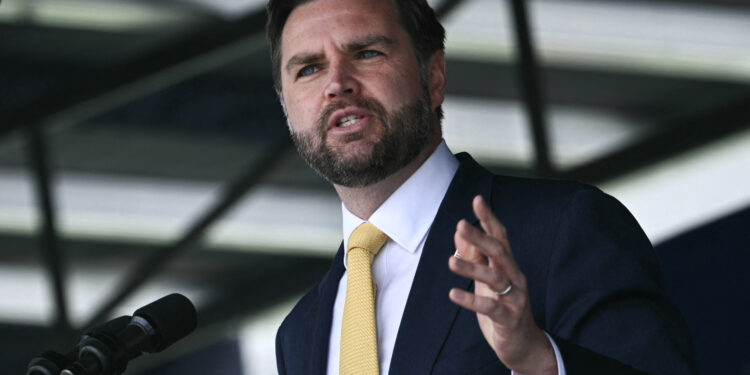Vice President JD Vance warned about the end of an “era of uncontested U.S. dominance” during his commencement speech at the Naval Academy on Friday.
Newsweek reached out to the White House for comment via email.
Why It Matters
Vance’s speech underscores the new approach to foreign policy embraced by the Trump administration. The perspective of Vance and President Donald Trump could have major implications for the United States’ foreign policy over the next four years and potentially beyond, as their perspective could reshape the Republican Party‘s approach to global affairs.
One foreign policy expert told Newsweek the speech may be the “clearest articulation” of the administration’s foreign policy doctrine.
What To Know
Vance, who served in the U.S. Marine Corps, touted the administration’s foreign policy stance during the address to Naval Academy graduates, saying the president’s recent trip to the Middle East “signified the end of a decades-long approach to foreign policy that, I think, was a break from the precedent set by our founding fathers.”
“What we’re seeing from President Trump is a generational shift in policy with profound implications for the job that each and every one of you will be asked to do,” the vice president said.
He said that the U.S. was a “superpower without any peer” for a brief time following the collapse of the Soviet Union, but the global stage has since changed.
“The era of uncontested U.S. dominance is over. Today we face serious threats in China, Russia and other nations determined to beat us in every single domain—from spectrum to low earth orbit to supply chains to even our communication infrastructure,” Vance said.

BRENDAN SMIALOWSKI/AFP via Getty Images
The Trump administration is focused on widening “the technological edge” between the U.S. military and adversaries, he said. He added that the U.S. cannot assume military engagements will “come without costs” and that the military must send troops to war “with the right tools.”
Vance also criticized past U.S. leaders who “traded national defense and the maintenance of our alliances for nation-building and meddling in foreign countries’ affairs.”
“Instead of devoting our energies to responding to the rise of near-peer competitors like China, our leaders pursued what they assumed would be easy jobs for the world’s preemptive superpower,” the vice president said. “How hard could it be to build a few democracies in the Middle East? Well, almost impossibly hard, it turns out, and unbelievably costly.”
The Trump administration has embraced a different approach to foreign policy from previous Republican administrations. Vance has made headlines for criticisms against NATO and a fiery meeting with Trump and Ukrainian President Volodymyr Zelensky earlier this year.
Javed Ali, a professor at the University of Michigan and former senior director for counterterrorism at the National Security Council, told Newsweek Vance’s remarks are “the latest and perhaps clearest articulation of the transformational shift underway in President Trump’s second term.”
“While aligning U.S. national security to America’s core interests has been expressed by other presidents, including during President Trump’s first term, the events of the last 100 days upon his return to office indicate a markedly different direction and higher velocity of change,” he said.
Ali pointed to the administration’s border policies, pressuring of allies to increase military spending, potential troop withdrawals, plans to build a new missile defense system, and considerations of “territorial expansion” in Greenland or Panama as parts of Trump’s New “national security framework.”
What People Are Saying
Nigel Gould-Davies, fellow at the International Institute for Strategic Studies, on X (formerly Twitter): “There have been signs in recent days that the VP is beginning to understand the realities of the war. Watch this space.”
Gerard Baker, Wall Street Journal editor-at-large, in an opinion article published Monday: “The problem with trying to identify a Trump Doctrine is that, as with so much about this most unique of American leaders, there’s no guarantee of consistency from one day to the next—either rhetorically or empirically.”
What Happens Next
Foreign policy, including military and trade, will be key issues the administration continues to tackle over the coming months.
Trump announced new tariffs on Europe as negotiations broke down on Friday. Economic policy remains a diplomatic sticking point between the U.S. and other nations, including longtime allies.
Update 5/23/25 5:42 p.m. ET: This article was updated with comment from Ali.
Vice President JD Vance warned about the end of an “era of uncontested U.S. dominance” during his commencement speech at the Naval Academy on Friday.
Newsweek reached out to the White House for comment via email.
Why It Matters
Vance’s speech underscores the new approach to foreign policy embraced by the Trump administration. The perspective of Vance and President Donald Trump could have major implications for the United States’ foreign policy over the next four years and potentially beyond, as their perspective could reshape the Republican Party‘s approach to global affairs.
One foreign policy expert told Newsweek the speech may be the “clearest articulation” of the administration’s foreign policy doctrine.
What To Know
Vance, who served in the U.S. Marine Corps, touted the administration’s foreign policy stance during the address to Naval Academy graduates, saying the president’s recent trip to the Middle East “signified the end of a decades-long approach to foreign policy that, I think, was a break from the precedent set by our founding fathers.”
“What we’re seeing from President Trump is a generational shift in policy with profound implications for the job that each and every one of you will be asked to do,” the vice president said.
He said that the U.S. was a “superpower without any peer” for a brief time following the collapse of the Soviet Union, but the global stage has since changed.
“The era of uncontested U.S. dominance is over. Today we face serious threats in China, Russia and other nations determined to beat us in every single domain—from spectrum to low earth orbit to supply chains to even our communication infrastructure,” Vance said.

BRENDAN SMIALOWSKI/AFP via Getty Images
The Trump administration is focused on widening “the technological edge” between the U.S. military and adversaries, he said. He added that the U.S. cannot assume military engagements will “come without costs” and that the military must send troops to war “with the right tools.”
Vance also criticized past U.S. leaders who “traded national defense and the maintenance of our alliances for nation-building and meddling in foreign countries’ affairs.”
“Instead of devoting our energies to responding to the rise of near-peer competitors like China, our leaders pursued what they assumed would be easy jobs for the world’s preemptive superpower,” the vice president said. “How hard could it be to build a few democracies in the Middle East? Well, almost impossibly hard, it turns out, and unbelievably costly.”
The Trump administration has embraced a different approach to foreign policy from previous Republican administrations. Vance has made headlines for criticisms against NATO and a fiery meeting with Trump and Ukrainian President Volodymyr Zelensky earlier this year.
Javed Ali, a professor at the University of Michigan and former senior director for counterterrorism at the National Security Council, told Newsweek Vance’s remarks are “the latest and perhaps clearest articulation of the transformational shift underway in President Trump’s second term.”
“While aligning U.S. national security to America’s core interests has been expressed by other presidents, including during President Trump’s first term, the events of the last 100 days upon his return to office indicate a markedly different direction and higher velocity of change,” he said.
Ali pointed to the administration’s border policies, pressuring of allies to increase military spending, potential troop withdrawals, plans to build a new missile defense system, and considerations of “territorial expansion” in Greenland or Panama as parts of Trump’s New “national security framework.”
What People Are Saying
Nigel Gould-Davies, fellow at the International Institute for Strategic Studies, on X (formerly Twitter): “There have been signs in recent days that the VP is beginning to understand the realities of the war. Watch this space.”
Gerard Baker, Wall Street Journal editor-at-large, in an opinion article published Monday: “The problem with trying to identify a Trump Doctrine is that, as with so much about this most unique of American leaders, there’s no guarantee of consistency from one day to the next—either rhetorically or empirically.”
What Happens Next
Foreign policy, including military and trade, will be key issues the administration continues to tackle over the coming months.
Trump announced new tariffs on Europe as negotiations broke down on Friday. Economic policy remains a diplomatic sticking point between the U.S. and other nations, including longtime allies.
Update 5/23/25 5:42 p.m. ET: This article was updated with comment from Ali.













